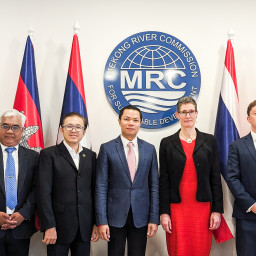Mekong countries agree with pact to protect water quality
Four Mekong countries today, for the first time, reached a transboundary agreement to protect the river’s water quality against emerging threats.
The accord, called the Procedures for Water Quality, commits the four riparian countries of the lower Mekong basin to adopt mutually-recognised standards for measurement, monitoring and assessment of quality of water resources in the basin.
The countries also embraced a framework for emergency response measures to help related agencies and local people deal with pollution incidents in a coordinating and cooperative manner.
The pact was agreed at the three-day meeting in Ho Chi Minh City which ends tomorrow, of environment and water ministers of Cambodia, Lao PDR, Thailand and Viet Nam. Observing participants include environmental experts and other regional stakeholders.
“This transboundary cooperation commitment is a major step towards securing the environmentally-sound future of the Mekong River,” said Jeremy Bird, Chief Executive Officer of the Mekong River Commission (MRC), the regional inter-governmental advisory body that facilitated the agreement.
“Together with implementation of the four other agreements under the 1995 Mekong Agreement, this will help bring about timely protection of both livelihoods of people and aquatic species throughout the basin,” added Mr Bird.
Currently, over 60 million people, most of them living in rural areas in the lower Mekong basin, depend very much on the river and its basin as main sources for food and income. Over 60% of the population have water-related occupations that are now vulnerable to potential environmental shocks and degradation.
Although the current development of riverine resources, for example in the agriculture, industrial and hydropower sectors, can tremendously benefit local people, the basin’s ecology and water quality are at risks of decline from increasing development pressures unless proper planning, management and monitoring are in place, said Mr Bird.
The agreement, which is mutually accepted, is a product of years of consultations between the countries and stakeholders. It outlines action plans on water quality criteria for measurement, monitoring and assessment. For example, oxygen concentration will be measured according to agreed standards to promote compliance with the minimum values. Other types of aquatic health, flora and fauna are covered by the agreement.
Whereas the river is yet to experience major transboundary pollution incidents, such as spills from industrial plants, the pact prepares the Mekong basin for dealing with potential harm. With specific instructions, member countries now will be able to timely and effectively respond to emergencies and immediately inform each other of the incidents.
Dr.Vithet Srinetr, MRC’s Environment Programme Coordinator, describes the river’s current water quality as generally good and acceptable in most parts, although there are quality concerns in some areas of high population and intense agriculture. He refers to the scientific quality level which is considered safe for human consumption and healthy for the environment.
“Water quality upstream impacts upon water quality downstream. The Procedures for Water Quality approved today signifies a common goal of the four countries to work together on this matter so that their people and the environment are well-protected,” said Dr. Vithet.
“We aim for communities to make connections on water quality between their localities and the rest of the basin, and know how to take actions should emergency occurs,” he said.
-ends-
Resources
- Procedures for Water Quality
- Frequently asked questions of the Procedures for Water Quality:
- Thai
- Vietnamese
- Country statements:
- Cambodia
- Lao PDR
- Thailand
- Viet Nam
For More Information
Mr Surasak Glahan, Communication Officer
Tel: 090 670 3527 (Ho Chi Minh mobile number) or +856 20 555 28726 (Vientiane mobile number)
Email: Surasak@mrcmekong.org





